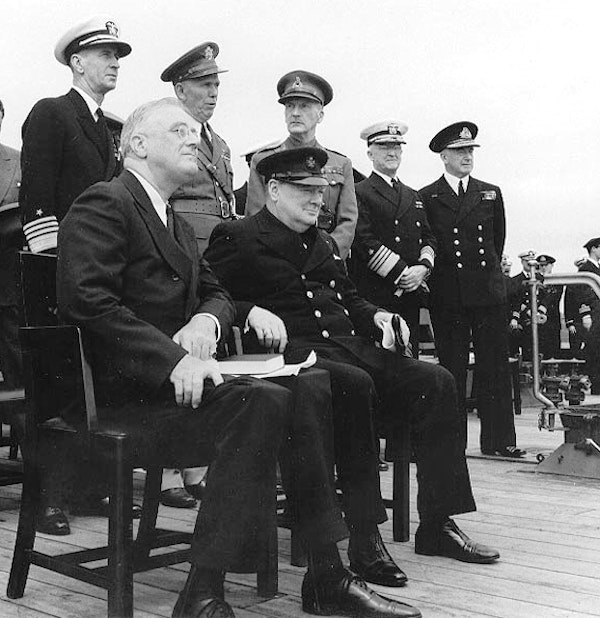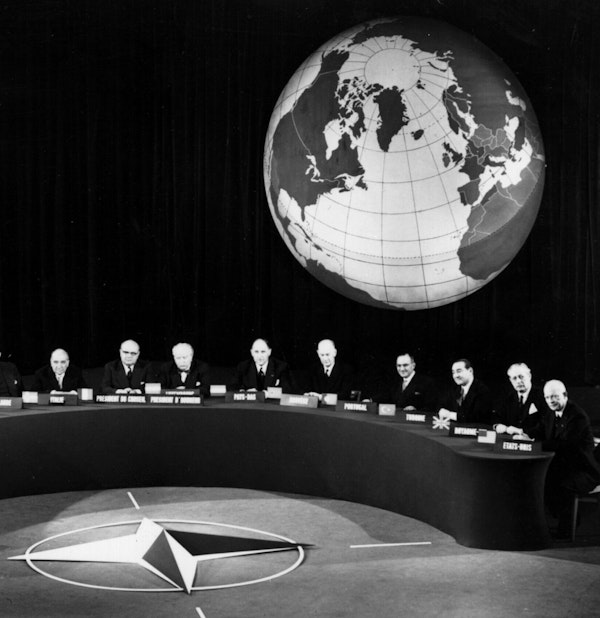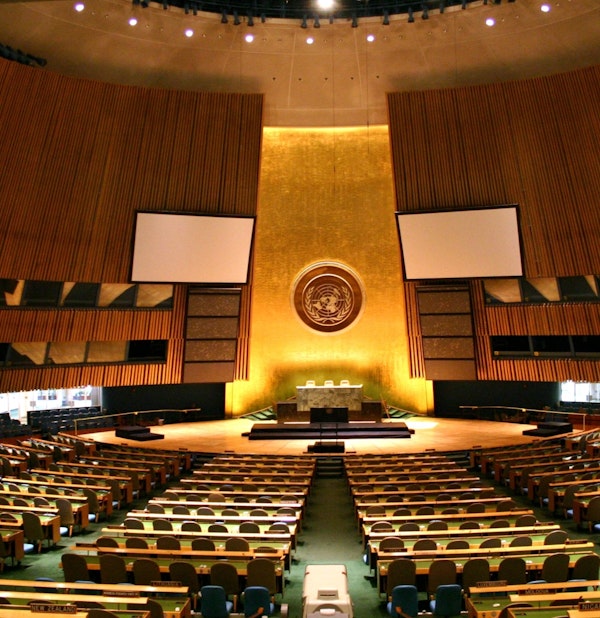A new conservative foreign policy
Why traditional U.S. values require advancing freedom around the globe.
 President Franklin Roosevelt and Prime Minister Winston Churchill meeting in Newfoundland to create the Atlantic Charter, Aug. 9-12, 1941. (Naval History and Heritage Command)
President Franklin Roosevelt and Prime Minister Winston Churchill meeting in Newfoundland to create the Atlantic Charter, Aug. 9-12, 1941. (Naval History and Heritage Command)
Historically, U.S. political parties have been incredibly malleable. Ever since a two-party system crystallized in the American election of 1800, the party out of power has had enormous incentives to mold its electoral platform to be the inverse of the policies enacted by the party in power. So, for example, Alexander Hamilton’s Federalists stood for a strong central government, while Thomas Jefferson’s Democratic-Republicans wanted states to be the predominant force. Since then, the parties have swapped queens several times. In the mid-20th century, Republicans championed states’ rights in order to counterbalance the Democrats’ expansions of federal reach. Yet in recent years, Republicans have often been the ones to extend federal authority to impose policy preferences on states. As these shifts suggest, no policy is permanently affixed to either party. Both Republicans and Democrats scramble to cobble together electoral majorities by trimming their sails and tacking toward popular opinion.
For those reasons, political parties are clearly not the guarantors of conservatism in the United States. Principles are. They are the stars by which conservatives should navigate.
And what are those principles? First and foremost, conservatism respects the individual, both by ascribing them inherent rights and by holding them accountable for their actions. As conservatives see it, people have rights that they loan to governments in limited ways for agreed purposes. This grounding in the dignity of the individual is what generates conservatives’ commitment to freedom, both domestically and in foreign policy. Because representative governance has proven the best model for maximizing human flourishing domestically, internationally minded conservatives think it is natural to extend that model to international behavior.
Despite the differences between the way domestic and international systems operate – especially the latter’s lack of a sovereign wielding a monopoly on violence – advancing freedom has proven the most cost-effective policy for preserving the security and expanding the prosperity of the United States. American power prevents wars that could endanger or impoverish us, and it discourages allied countries from building arsenals – including nuclear arsenals – that could create regional instability. Yet neither the United States nor the countries it chooses to protect have to shoulder the burdens of defense by themselves. While it’s true that the United States bears the largest share of these costs, it is also true that no dominant power has ever enjoyed as much help upholding its advantages as we have received since 1945.
 Delegates at the NATO conference in Paris on Dec. 19, 1957. (Keystone / Getty Images)
Delegates at the NATO conference in Paris on Dec. 19, 1957. (Keystone / Getty Images)
Keeping the peace
Advancing freedom has minimized the costs of keeping the peace and ensuring prosperity for both the United States and its partners. One key reason why this system works so well is that democracies don’t fight each other. Democracies do fight a lot of wars – they just don’t fight them against each other. The only exception is the Cod Wars, a series of skirmishes (albeit not very violent ones) between the United Kingdom and Iceland staring in 1952, which Iceland won despite not even having a military. After a series of boat-ramming attacks and other confrontations led to NATO mediation, London ultimately conceded the issue because that’s what democracies tend to do: They opt for the peaceful settlement of disputes whenever possible, and they favor consensual resolutions over pushing to the wall for maximum advantage.
This approach has stood the test of time. Game theorists like Thomas Schelling have demonstrated that maximizing gains to the detriment of other players can be a smart strategy in games featuring only a single iteration, but that in games with multiple rounds, achieving consensus provides all players with better outcomes. That is how democracy works, and it is how the international order that the United States and its allies created after World War II has maximized U.S. security while minimizing its costs.
The leaders who crafted this order weren’t starry-eyed liberals. They had lived through, and many of them had fought in, two world wars, and they had endured the privations of the Great Depression. They wanted a stabler system, one that would do a better job preserving individual freedom and creating prosperity.
 United Nations General Assembly Hall in New York City. (Patrick Gruban / UN General Assembly via Flickr)
United Nations General Assembly Hall in New York City. (Patrick Gruban / UN General Assembly via Flickr)
Their initial inclination was to share responsibility, minimizing what the United States would have to contribute. This thinking led to the creation of the United Nations, with a General Assembly made up of all internationally recognized states, and a Security Council on which the wartime allies – China, France, the Soviet Union, the United Kingdom, and the United States – would get permanent seats. The Security Council’s permanent members were also given veto power to ensure their interests would be respected. Almost as soon as the United Nations came into being, however, it became clear that the institution would be insufficient for preserving security, not least because recovery from the economic deprivations of the war were creating vulnerabilities in free societies.
That realization prompted the United States to come up with the Marshall Plan. This economic assistance program explicitly linked freedom with prosperity. As U.S. Secretary of State George Marshall announced in June 1947, “its purpose should be the revival of a working economy in the world so as to permit the emergence of political and social conditions in which free institutions can exist.” U.S. aid was offered to the Soviet Union and occupied Germany as well as the countries that had been their victims, based on the argument that desperation produced terrible political outcomes, whereas giving people a stake in the system through increased prosperity would lead to boring, functional democracies. The Soviet Union refused aid and denied it to its satellite states, but the program of infusing money, modernizing industry, and removing trade barriers was unquestionably successful – leading not only to the economic recovery and political stabilization of Western Europe, but the expansion of markets for U.S. goods. And the United States institutionalized monetary management with the Bretton Woods institutions. By 1951, the economies of the participants in the Marshall Plan were more than a third larger than they had been in 1938.
Important as they were, these advances were endangered by the looming threat of war with the Soviet Union, so the United States reluctantly had to extend itself yet further by developing an alliance to defend Western Europe and prevent overburdening its allies’ economic recovery with military expenditures. Thus, NATO was added to the system. And what worked in Europe became the model for other regions, although both the local conditions and American willingness to extend itself varied.
 A Canadian store boycotting American products, Vancouver, British Columbia, March 28, 2025. (VCG / Getty Images)
A Canadian store boycotting American products, Vancouver, British Columbia, March 28, 2025. (VCG / Getty Images)
A conservative order
The United States was not the only beneficiary of the political, economic, and military policies that created the post-World War II order, but it was and remains a major beneficiary – perhaps the greatest beneficiary. And while this order was imagined and enacted by leaders of both U.S. political parties, it is a fundamentally conservative project. Although the order is sometimes called a “liberal” one, the word is meant in its traditional sense, meaning rules- and rights-based. The order is founded on belief in the dignity of the individual, and the need to preserve individual rights has led to policies that advance freedom, support democratic governance, reduce barriers to international trade, and build institutions to resolve conflict and enshrine compromise and cooperation.
Given the conservative and beneficial nature of the order, it is disappointing that, over the last two decades, many Republican officials have lost faith not only in the idea that the order serves American interests, but also that the United States has the ability to reform its institutions and shape its activities. In several cases, Washington has chosen to withdraw from participation rather than fight for leadership roles and policies that protect and advance its interests. Yet by ceding leadership to others, we risk being subjected to rules others have crafted to limit U.S. power.
Even more concerning than receding from leadership has been the Trump Administration’s outright assaults on the international order. The administration does not seem to believe that it is less expensive to share the burden of common defense, that the United States is safest when other governments are democratic, that trade creates and expands markets everywhere, or that U.S. interests are advanced through international institutions.
Our country, and the world, are now in the midst of an experiment testing whether the truths that American leaders have held to be self-evident for 80 years remain the country’s best options. The United States benefits when other countries want us to succeed. It is historically anomalous for a country as powerful as the United States not to activate more opposition against it (political scientists call this “balancing against”). Yet with a few notable exceptions, ever since World War II, few other states have attempted to prevent America’s success – typically because the system has also benefitted their security, economy, or both.
Today, however, we are beginning to see even friendly and allied countries make choices inimical to American interests. Afraid of the United States’ growing unpredictability and even hostility, they are attempting to reduce their reliance on us and to shield themselves from our influence. They are cooperating with each other to gain the economy of scale to match us. They are hesitating to buy our weapons because we denied them to a democratic country under attack. They are boycotting canonical American products and travel to the United States. They are even beginning to reevaluate whether concessions to Beijing would be less destructive than reliance on Washington because while neither are in their interests, at least China’s behavior is less erratic.
This balancing against the United States will make everything we try to do in the world more expensive and more difficult. Want to prevent terrorist attacks in the United States? You need intelligence collection by other countries, as well as cooperation on immigration. Want to rebuild the U.S. defense-industrial base? You need critical minerals mined and processed in other countries – countries that have lots of potential buyers. Want to destroy the Iranian nuclear weapons program? You’ll need the shared intelligence, access to territory and airspace, economic sanctions, and United Nations votes of several countries that will be hesitant to trust that we will protect them from reprisal.
Conservatism at its essence is about preserving what has value; that is the actual meaning of the word. Current U.S. foreign policy is not conservative, since it is undermining the system and squandering the goodwill that has served U.S. interests well for nearly a century. Unless the United States moves quickly to reestablish a conservative foreign policy based on the defense of human dignity, the expansion of economic opportunity, and the attempt to make the world a freer and safer place, it may soon find there is no longer a liberal international order to conserve.
The Catalyst believes that ideas matter. We aim to stimulate debate on the most important issues of the day, featuring a range of arguments that are constructive, high-minded, and share our core values of freedom, opportunity, accountability, and compassion. To that end, we seek out ideas that may challenge us, and the authors’ views presented here are their own; The Catalyst does not endorse any particular policy, politician, or party.

